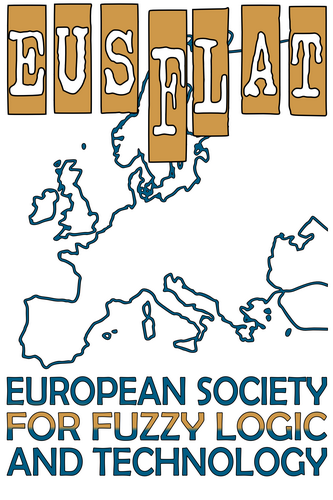EUSFLAT 2017
The 10th Conference of
the European Society for Fuzzy Logic and Technology
Warsaw, Poland, September 11-15, 2017





Special sessions
1. Aggregation Functions: Recent Trends and Developments
Organizers: Humberto Bustince, Tomasa Calvo, Radko Mesiar
Description
Aggregation functions are nowadays a basic tool for any procedure where the fusion of information is required. In recent times, the interest and the work in this field is rapidly growing and have led to a deep study of not only classical aggregation functions such as weighted means, t-norms or t-conorms, but also of others such as those constructed by means of Choquet or Sugeno integrals, copulas, overlap and grouping functions or ignorance functions, among many others, as well as of generalizations of the notion of aggregation function, as it is the case of pre-aggregation functions. All these developments have been closely linked to an increasing number of applications in many different topics, from image processing to classification, machine learning or decision making, just to mention a few of them.
The aim of this special session is to bring researchers in the field of Aggregation Functions, to exchange their ideas and approaches, to discuss and to present latest results on this field, both from a theoretical and an applied point of view. In this way, it will follow the rich tradition of Special Sessions in Aggregation Functions from previous EUSFLAT Conferences.
Topics
Topics include, but are not limited to:
- Properties of aggregation functions
- Generalizations of the idea of aggregation function
- Copulas and triangular norms
- Fuzzy measures and integrals
- Averaging aggregation functions
- Aggregations with ordinal and nominal scales
- Aggregation functions for extensions of fuzzy sets
- Aggregation on posets and lattices
- Security intelligence, analysis and decision support
- Evaluation problems
- Medical decision problems
- Hybrid intelligent systems and computational intelligence
- Approximate reasoning
- Image processing
- Model identification and parametrization
- Diagnostics and prognostics
- Data mining
Organizers
Humberto Bustince
bustince@unavarra.es
Tomasa Calvo
tomasa.calvo@uah.es
Radko Mesiar
mesiar@math.sk
2. Algorithms for Data Aggregation and Fusion
Organizers: Bernard De Baets, Marek Gągolewski, Simon James
Description
Aggregation theory by default deals with mathematical aspects of diverse ways to summarize homogeneous data. This includes the construction and analysis of functions that act on elements in the real line (means, t-norms, t-conorms, fuzzy implications) as well as other lattices.
This session is focused on algorithmic aspects of data aggregation and fusion, including big, computationally demanding, complex and/or heterogeneous data sets. Non-standard and non-classical approaches to aggregation are especially welcome.
Topics
Topics include, but are not limited to:
- complex data aggregation and fusion:
- multidimensional real vectors
- rankings
- character strings (DNA sequences, etc.)
- directional and spatial data
- trees and other types of graphs
- intervals and fuzzy quantities
- time series
- big data problems
- algorithmic challenges of classical aggregation functions
- learning aggregation functions from data
- record linkage between heterogeneous data sets
- applications:
- bioinformatics
- decision making
- data analysis
- classification
- clustering
- computational statistics
- bibliometrics
- economics
- pattern recognition
- plagiarism detection
- automated spelling correction
Organizers
Bernard De Baets
KERMIT, Department of Mathematical Modelling, Statistics and Bioinformatics,
Ghent University
Ghent, Belgium
Bernard.DeBaets@ugent.be
Marek Gągolewski
Systems Research Institute,
Polish Academy of Sciences
Warsaw, Poland
gagolews@ibspan.waw.pl
Simon James
School of Information Technology,
Deakin University
Melbourne, Australia
simon.james@deakin.edu.au
3. Extensions of Fuzzy Sets in Decision Making
Organizers: Cengiz Kahraman, Basar Oztaysi, Sezi Cevik Onar
Description
Fuzzy sets have a history starting from ordinary fuzzy sets and extending to other types of fuzzy sets: Ordinary fuzzy sets (Zadeh, 1965), interval-valued fuzzy sets (Zadeh, 1975; Grattan-Guiness, 1975; Jahn, 1975; Sambuc, 1975), type-2 fuzzy sets (Zadeh, 1975), intuitionistic fuzzy sets (Atanassov, 1986), fuzzy multisets (Yager, 1996), neutrosophic sets (Smandarache, 1999), nonstationary fuzzy sets (Garibaldi and Ozen, 2007), Hesitant fuzzy sets (Torra, 2010).
Each of these extensions has been used in the solutions of single criterion and multiple criteria decision making problems. Ordinary fuzzy sets, intuitionistics fuzzy sets and hesitant fuzzy sets are the most used extensions in the fuzzy sets history. Neutrosophic sets are the generalization of intuitionistic fuzzy sets and they seem to be competitive with the other extensions of fuzzy sets in the future.
Decision making is the study of identifying and choosing alternatives based on the values and preferences of a decision maker. Making a decision implies that there are alternative choices to be considered, and in such a case we want not only to identify as many of these alternatives as possible but to choose the one that best fits with our goals, objectives, desires, values, and so on. It is very important to make distinction between the cases whether we have a single or multiple criteria. The case when we have a finite number of criteria but the number of the feasible alternatives (the ones meeting the requirements) is infinite belongs to the field of multiple criteria optimization. Also, techniques of multiple criteria optimization can be used when the number of feasible alternatives is finite but they are given only in implicit form. Decision making problems when the number of the criteria and alternatives is finite, and the alternatives are given explicitly are called multiattribute decision making (MADM) problems.
This special session aims to include the papers trying to solve single criterion or multiple criteria problems using the extensions of ordinary fuzzy sets. The papers may be theoretical or practical decision making works.
Topics
Topics include, but are not limited to:
- Decision support systems in sustainability and environment
- Making decision under uncertainty in health care systems
- Intuitionistic & hesitant fuzzy multiple criteria decision making
- Advances in decision making under uncertainty, ignorance, inconsistency, and vagueness
- Logistics engineering: modeling, optimization and simulation
- Operations research and operations management
- Production planning and control
- Data mining and big data
- Engineering economics decision making
- Statistical decision making
Organizers
Cengiz Kahraman
Industrial Engineering Department, Istanbul Technical University,
Macka, Istanbul, 34367, Turkey
kahramanc@itu.edu.tr
Basar Oztaysi
Industrial Engineering Department, Istanbul Technical University,
Macka, Istanbul, 34367, Turkey
oztaysib@itu.edu.tr
Sezi Cevik Onar
Industrial Engineering Department, Istanbul Technical University,
Macka, Istanbul, 34367, Turkey
sezicevik@yahoo.com
4. Fuzzy Logic, Formal Concept Analysis, Mathematical Morphology and Related Topics
Organizers: Chris Cornelis, Jesús Medina, Manuel Ojeda Aciego
Description
Fuzzy Logic, Formal Concept Analysis and Mathematical Morphology are three important tools to handle information from databases. The purpose of this Special Session is to provide an international forum for presentation of recent results, advances and interactions among these important tools.
Topics
The not exhaustive list of topics includes:
- Fuzzy sets and fuzzy logic
- Logic programming
- Formal concept analysis
- Fuzzy relation equations
- Mathematical morphology
- Aggregation operators in relational data analysis
Organizers
Chris Cornelis
University of Ghent, Belgium
Chris.Cornelis@UGent.be
Jesús Medina
University of Cádiz, Spain
jesus.medina@uca.es
Manuel Ojeda Aciego
University of Málaga, Spain
aciego@uma.es
5. Fuzzy Modelling of Dynamic Systems
Organizers: Juan Albino Méndez, Basil M. Al-Hadithi, Fernando Matía
Description
Intelligent control covers different techniques such as expert systems, fuzzy logic, neural networks or genetic algorithms. However, fuzzy logic has demonstrated to be the most used in industrial applications. The key for this is its ability to represent expert control/modeling knowledge and experience. Another factor contributing to the deployment of fuzzy applications in industry is the growing computational power of embedded systems. Thus, fuzzy applications are present in all levels of the automation pyramid and appear as a powerful tool for modeling, identification and control of complex plants.
The scope of the session will be focused in fuzzy logic modelling of dynamic systems. Both relevant theoretical contributions and applications will be considered. The aim of this initiative is to bring together researchers on intelligent systems field that focus their interest in fuzzy logic modelling, and put together their latest advances in its state of the art or applications. As such, the session aims to provide both an overview of the current top quality research in this area, and at the same time to explore new trends in fuzzy modelling methodologies.
Topics
Topics include, but are not limited to:
- Fuzzy identification and fuzzy modeling
- Hybrid-fuzzy modelling and identification
- Fuzzy clustering models
- Fuzzy modelling of high dimensional systems
- Inverse model identification
Organizers
Juan Albino Méndez
Department of Computer Science and Systems Engineering,
University of La Laguna
jamendez@ull.edu.es
Basil M. Al-Hadithi
Center for Automation and Robotics,
Universidad Politécnica de Madrid,
basil.alhadithi@upm.es
Fernando Matía
Center for Automation and Robotics,
Universidad Politécnica de Madrid,
fernando.matia@upm.es
6. Fuzzy Quantifiers in Fuzzy Natural Logic
Organizers: Antonín Dvořák, Michal Holčapek, Vilém Novák
Description
Fuzzy quantification is an important and active field of research using tools and results from mathematical logic, generalized quantifier theory, linguistics, measure and integral theory as well as other fields. Fuzzy quantification is applied in data mining, databases, learning, image processing, decision making, etc. Nowadays, one can find several approaches to fuzzy quantification stemming from, e.g., pioneering Zadeh's approach of type I and II sentences evaluation, axiomatic treatment of quantifier fuzzification mechanisms, residuated lattice based generalization of Generalized Quantifier Theory, intermediate quantifiers defined syntactically in Fuzzy Type Theory, or representation level approach. Hence, there is a need to compare and/or unite these approaches and possibly formulate a new perspective of research in fuzzy quantification.
Fuzzy Natural Logic (FNL) is a class of mathematical theories (theory of evaluative expressions, theory of fuzzy IF-THEN rules and approximate reasoning based on them, theory of fuzzy generalized quantifiers and syllogisms, etc.) with the goal to model human thinking characterized by the use of natural language. Because the theory of fuzzy quantification is one of the basic constituents of FNL, we think that it would be interesting to look also at the other parts of FNL from the point of view of possible interrelations and mutual applications.
Topics
Topics include, but are not limited to:
- theoretical results in various approaches fuzzy quantification,
- theory of generalized intermediate syllogisms and square of opposition,
- comparison of various approaches to fuzzy quantification,
- development of various theories belonging to FNL,
- applications of fuzzy quantification and other parts of FNL in data mining, linguistics, learning, image processing, decision making, databases, analysis of time series, and elsewhere.
Organizers
Antonín Dvořák
Institute for Research and Applications of Fuzzy Modeling,
Center of Excellence IT4Innovations,
University of Ostrava, the Czech Republic
antonin.dvorak@osu.cz
Michal Holčapek
Institute for Research and Applications of Fuzzy Modeling,
Center of Excellence IT4Innovations,
University of Ostrava, the Czech Republic
michal.holcapek@osu.cz
Vilém Novák
Institute for Research and Applications of Fuzzy Modeling,
Center of Excellence IT4Innovations,
University of Ostrava, the Czech Republic
vilem.novak@osu.cz
7. Image Processing with Fuzzy Techniques
and Edge Detection competition
Organizers: Humberto Bustince, Javier Montero, Irina Perfilieva
Description
The Special Session will be focused on theoretical and application aspects of image processing in general and advantage of fuzzy (soft computing) techniques in this field in particular. The objective of this special session is to present original developments that are useful in any application of computer vision, going from image processing techniques to more sophisticated aspects of computer vision and image understanding.
This time the Special Session on image processing includes a competition which is focused on Edge Detection. The details are on the web page http://irafm.osu.cz/edge2017/main.php. The winner will be awarded with EUSFLAT Diploma, and the best solutions will be presented on the special session.
Topics
Topics include, but are not limited to:
- Image enhancement, filtering, noise removal, restoration,
- Image compression and reduction,
- Segmentation, thresholding and edge detection,
- Feature extraction, pattern recognition,
- Mathematical morphology,
- Image similarity and image retrieval,
- Video processing and retrieval,
- Multidimensional data analysis and visualization,
- Multi-modal image analysis,
- Remote sensing,
- Scene understanding.
With applications to:
- Medical imaging
- Computer vision
- Image processing on wearable devices
Important dates
| Full paper submission deadline: | March 31, 2017 |
| Notification of acceptance/rejection: | April 23, 2017 |
| Submission of final papers: | May 13, 2017 |
Organizers
Humberto Bustince
bustince@unavarra.es
Javier Montero
jamonter@ucm.es
Irina Perfilieva
irina.perfilieva@osu.cz
8. Intelligent Decision Making Systems and Consensus
Organizers: Francisco Chiclana, Francisco Javier Cabrerizo, Yucheng Dong, Enrique Herrera-Viedma
Description
Intelligent decision making processes are developed by automatic decision-making systems that support individual or organisational decision making processes using different Information Technologies (as the Web and social networks) and Artificial Intelligence tools (as Computational Intelligence tools). The intelligent decision making processes involve the use of preference modelling and consensus processes. The preference modelling deals with the representation and modelled of the preferences provided by the experts in the problems. The fuzzy logic is a computational intelligence tool that provides an adequate framework to deal with the uncertainty presented in the user opinions. The fuzzy preference modelling has been satisfactory applied in intelligent decision making. On the other hand, consensus is an important area of research in intelligent decision making. Consensus is defined as a state of mutual agreement among members of a group where all opinions have been heard and addressed to the satisfaction of the group. A consensus reaching process is a dynamic and iterative process composed by several rounds where the experts express, discuss and modify their preferences. The objective of the proposed session is to highlight the ongoing research on intelligent decision making, fuzzy preference modelling and consensus processes under uncertainty. Focusing on theoretical issues and applications on various domains, ideas on how to solve consensus processes in intelligent decision making under fuzzy preference modelling, both in research and development and industrial applications, are welcome. Papers describing advanced prototypes, systems, tools and techniques and general survey papers indicating future directions are also encouraged.
Topics
Topics appropriate for this special session include, but are not limited to:
- Fuzzy preference modelling in intelligent decision making
- Intelligent decision making system applications
- Consensus in fuzzy multi-agent decision making
- New models of fuzzy preference modelling
- Intelligent decision making system for big data
- Intelligent decision making in Web 2.0 framework
- Intelligent decision making in presence of incomplete information
- Intelligent decision making in dynamic context
Organizers
Francisco Chiclana
De Montfort University, UK
chiclana@dmu.ac.uk
Francisco Javier Cabrerizo
UNED, Spain
cabrerizo@issi.uned.es
Yucheng Dong
Sichuan University, Chengdu, China
ycdong@scu.edu.cn
Enrique Herrera-Viedma
Granada University, Spain
viedma@decsai.ugr.es
9. Mathematical Fuzzy Logic
Organizers: Brunella Gerla, Tommaso Flaminio
Description
This special session is devoted to the most recent developments in the realm of many-valued logics, with particular emphasis on theoretical advances related to algebraic or alternative semantics, combinatorial aspects, topological and categorical methods, proof theory and game theory, many-valued computation.
Topics
A partial list of topics is the following:
- Algebraic semantics of many-valued logics
- Applications of many-valued logics to Formal Concept Analysis and Relational Methods
- Applications of many-valued logics to Fuzzy Sets and to Rough Sets
- Combinatorial or topological dualities
- Computational complexity of many-valued logics
- Modal logic approaches to probability and uncertainty in many-valued logics
- Natural and alternative semantics for many-valued logics
- Proof theory for many-valued logics
- Subjective probability approaches to many-valued logics and non-classical events
Organizers
Brunella Gerla
Universitá degli Studi dell'Insubria, Italy
brunella.gerla@uninsubria.it
Tommaso Flaminio
Universitá degli Studi dell'Insubria, Italy
tommaso.flaminio@uninsubria.it
10. Representing and Managing Vagueness: Different Scenarios, Different Tools
Organizers: Davide Ciucci, Jesús Medina, Łukasz Sosnowski
Description
The notion of vagueness has been extensively analysed in the last decades by philosophers, logicians and computer scientists. Here we are interested in the vagueness originated by different characteristics and flaws in information: incompleteness, imprecision, graduality, granularity, contradiction between agents, etc. For each of these aspects one (or more) specific tool has been introduced in literature: fuzzy sets, rough sets, possibility theory, Dempster-Shafer theory, interval analysis, compound objects comparators, etc. Further, when more than one form of vagueness are present at the same time, it seems natural to fuse such tools, as in the fuzzy rough set case.
The special session is devoted to collect all contributions that deal with scenarios leading to a form of vagueness and tools to represent and manage it. In particular, all critical discussions, comparisons among two or more forms of vagueness and/or comparisons and fusion of two or more tools are welcome.
Topics
The not exhaustive list of topics includes:
- rough sets (classical, probabilistic, game-theoretic, etc.)
- fuzzy rough sets
- interval-valued fuzzy sets
- possibility theory
- supervaluations
- paraconsistent logics
- near sets
- interval analysis
- grey sets
- non-classical logics (many valued, paraconsistent, epistemic,...)
- similarity Based Reasoning
- networks of comparators
Organizers
Davide Ciucci
University of Milano-Bicocca, Italy
ciucci@disco.unimib.it
Jesús Medina
University of Cádiz, Spain
jesus.medina@uca.es
Łukasz Sosnowski
Systems Research Institute
Polish Academy of Sciences
sosnowsl@ibspan.waw.pl
Panel sessions
EUSFLAT 2017 Special Panel Session to commemorate the work and life of late Professor Witold Kosiński
Panel moderator: Dominik Ślęzak, University of Warsaw, Poland
Background
This panel is organized as a tribute to Professor Witold Kosiński (August 13, 1946 - March 14, 2014) - a very friendly human and an extremely active researcher. Professor Kosiński worked with a number of scholars in the fields of Computer Science and Information Systems, with a special emphasis on Soft Computing and Artificial Intelligence. He was permanently on his scientific journey, evolving toward new approaches, looking for new inspirations. He left us with unfinished publications and ideas that still need discussion. We believe that this panel will let us gather and revisit those ideas. We will try to achieve it by following Professor Kosiński's openness to combine different methods and search for new opportunities of applications.
Topics and Format
Major areas of Professor Kosiński's scientific activities will be introduced by his friends and colleagues. The meaning of those areas will be discussed from both historical and work-in-progress points of view. The topics will include (but will not be limited to):
- Fuzzy Sets & Fuzzy Numbers
- Nature-Inspired Algorithms
- Artificial Neural Networks
- Engineering of Materials
The talks will be followed by an open discussion on innovative potential of the presented ideas. Given the scope of EUSFLAT, the focus will be mostly on the first out of the above topics, additionally illustrated by the recent book on Theory and Applications of Ordered Fuzzy Numbers. Nevertheless, the panelists will discuss interconnections among all the aforementioned scientific areas, which were particularly visible in the research conducted by Professor Witold Kosiński.